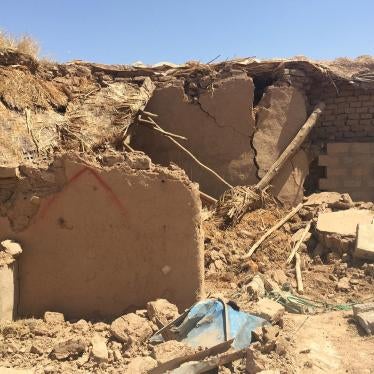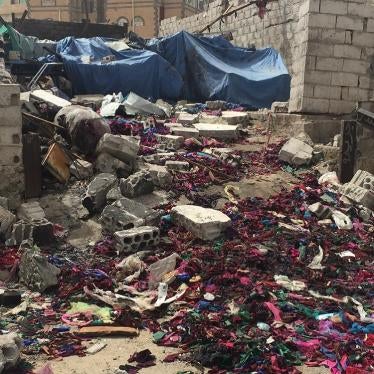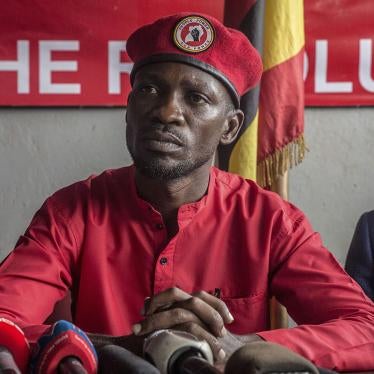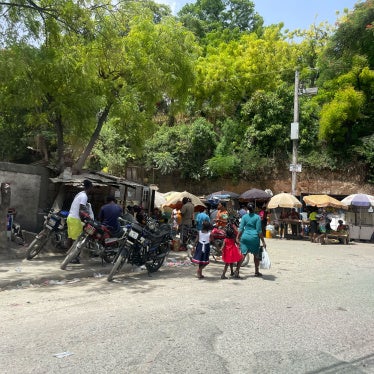In response to Human Rights Watch’s April 8 letter to the leaders of the Mistrata Councils, the Misrata Local Council sent this reply on April 11 (Human Rights Watch translation; original in Arabic):
National Transitional Council, Libya
Misrata Local Council
Statement from the Misrata Local Council on the Human Rights Organization Report
The Misrata Local Council received with great interest the letter from Human Rights Watch to the city’s local council and military council. The letter explicitly accused the revolutionaries of Misrata of perpetrating several violations and crimes that may amount to crimes against humanity. The letter concluded by threatening to hold officials on the city’s local council and military council responsible for these abuses and the failure to stop and prevent them.
In response to these accusations, we note that the Misrata Local Council, immediately upon the assumption of its mission after its election by the city’s residents, formed a security committee composed of some members of the local council, the heads of the city’s security committees, and the directors of prisons, in order to take action to respect the rights of defendants in the city and exercise oversight over prisons to prevent any violations inside of the [detention] facilities. This is what our religion calls us to do, and, as Muslims, we, before all others, are keen to respect these rights. We also called for the importance of a comprehensive count of all defendants in the city of Misrata.
While the Misrata Local Council condemns any human rights violations committed anywhere in Libya, it affirms that treatment in the city’s prisons is good, taking available capacities into consideration, especially because the detention facilities are civil structures not originally designated for detention. We have demanded from the government the need to equip a prison to hold defendants that meets international standards, and we have asked the government to prosecute defendants swiftly in fair trials after the Public Prosecution reviews their files and obtains sufficient evidence. In this framework, we affirm that we are ready to turn detainees over to the Ministry of Justice at any time. This has been agreed upon with the deputy minister of justice, and some prisons have indeed been turned over to the judicial police, and the persons supervising these prisons have been made brought under the authority of the judicial police.
If there have been violations or irregularities, these are no more than individual, and not systematic infractions. We have worked and are working to prevent this, and we are willing to prosecute any person proven to have committed violations, whatever his status or rank. In this regard, we stress our willingness to cooperate with all national and international rights organizations.
In turn, we send a message to all true revolutionaries who rose against injustice and tyranny to respect the rights of defendants and treat them as ordered by our noble [religious] law, until such times as they are prosecuted in fair trials where the perpetrator may receive his punishment in accordance with the law.
The HRW letter leveled a set of accusations against Misrata revolutionaries in particular, even those that took place outside the city of Misrata. We know that many violations have been wrongly and falsely attributed to Misrata revolutionaries, such as those that took place a few months ago in the Janzur area against some residents of Tawergha. There are some brigades located outside the city of Misrata. These have been linked to the Misrata revolutionaries, but these brigades are not subject to the authority of the Misrata Local Council or its military council. Therefore, these brigades do not represent the city of Misrata or Misrata revolutionaries, particularly because most of their members are from other cities. Any actions these brigades take cannot be attributed to the Misrata revolutionaries.
Regarding Tawergha, we note that the people of Misrata and the revolutionaries of Misrata did not forcibly displace the people of Tawergha. Rather, they fled with brigades after their defeat. As such, the allegations in the HRW letter are unfounded in this matter. When the Misrata revolutionaries entered Tawergha, they found a few elderly people, children, and women – no more than 80 people – who were treated well and were provided with transportation, based on their request, to join their relatives in various cities. During these days, there was no attack on the property of the residents of Tawergha or their homes. What was done by unknown persons were individual acts that cannot be attributed to a particular body or specific persons. These assaults occurred after voices were raised and pressure increased on the people of Misrata to permit the people of Tawergha to return to their homes. Although no one has prevented the people of Tawergha from returning to their homes, we know that the people of Tawergha depend entirely on the city of Misrata for their livelihood, as it provides them with jobs and food. This means their return without the provision of jobs in their area is virtually impossible because they will be like refugees in their homes.
As coexistence between the two areas is impossible at the current time, we believe it is necessary to search for alternative solutions that will be appropriate and acceptable to the people of Tawergha. This is an appeal to the government and all citizens to solve this problem on the national level.
Despite this, there are still families from Tawergha that continue to reside in the city of Misrata because they did not leave during the war. They have become part of the residents of Misrata, with the same rights and duties. There are among them martyrs who sacrificed themselves for the city, and their relatives have been treated like other families of martyrs in Misrata. Like all martyrs’ families they went on the pilgrimage and were given the same compensation given to other families.
In conclusion, the Misrata Local Council welcomes all constructive criticism with the goal of protecting human rights, and it rejects the threats and admonitions issued by the organization (HRW). We ask the Libyan state to swiftly activate the law on transitional justice and provide all means of achieving this.
- Misrata Local Council






